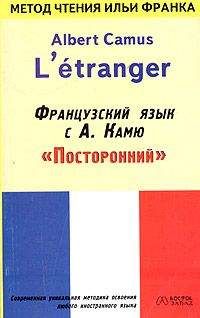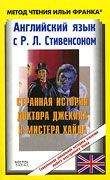Роберт Стивенсон - Английский язык с Р.Л.Стивенсоном. Остров сокровищ
I ran to him at once (я кинулся к нему сразу), calling to my mother (зовя мать). But haste was all in vain (но спешка была впустую = было поздно). The captain had been struck dead by thundering apoplexy (капитан был убит ужасным: «громоподобным» ударом). It is a curious thing to understand (это странная вещь чтобы понять = и странное дело), for I had certainly never liked the man (так как мне никогда определенно не нравился этот человек), though of late I had begun to pity him (хотя в последнее время я начал жалеть его), but as soon as I saw that he was dead (но, как только я увидел, что он мертв), I burst into a flood of tears (я залился потоком слез). It was the second death I had known (это была вторая смерть, которую я знал = случилась на моих глазах), and the sorrow of the first was still fresh in my heart (и печаль /от/ первой была еще свежа в моем сердце).
peculiar [pɪ`kju:lɪə] height [haɪt] thundering [`θʌndərɪŋ] floor [flɔ:] flood [flʌd]
“Ten o’clock!” he cried. “Six hours. We’ll do them yet;” and he sprang to his feet.
Even as he did so, he reeled, put his hand to his throat, stood swaying for a moment, and then, with a peculiar sound fell from his whole height face foremost to the floor.
I ran to him at once, calling to my mother. But haste was all in vain. The captain had been struck dead by thundering apoplexy. It is a curious thing to understand, for I had certainly never liked the man, though of late I had begun to pity him, but as soon as I saw that he was dead, I burst into a flood of tears. It was the second death I had known, and the sorrow of the first was still fresh in my heart.
Chapter IV (глава 4)
The Sea Chest (матросский: «морской» сундук)
I LOST no time, of course (я не терял времени, конечно), in telling my mother all that I knew (рассказав матери все, что я знал; to know), and perhaps should have told her long before (и, наверное, должен был рассказать ей /об этом/ гораздо раньше; long before — задолго до /того/), and we saw ourselves at once in a difficult and dangerous position (и мы увидели себя = очутились сразу в трудном и опасном положении).
Some of the man’s money (часть денег того человека /капитана/) — if he had any (если у него были какие-нибудь /деньги/) — was certainly due to us (несомненно, причиталась нам; due to — причитающийся); but it was not likely that our captain’s shipmates (но было маловероятно, что /морские/ товарищи нашего капитана), above all the two specimens seen by me (прежде всего — два типа, виденных мной), Black Dog and the blind beggar (Черный Пес и слепой нищий), would be inclined to give up their booty in payment of the dead man’s debts (отказались бы отдать свою добычу для уплаты долгов покойного; to be inclined to — быть склонным к; to give up — бросить, оставить, уступить). The captain’s order to mount at once and ride for Doctor Livesey (приказ капитана сесть на лошадь и скакать за доктором Ливси) would have left my mother alone and unprotected (оставил бы мою мать одну и без защиты), which was not to be thought of (о чем нельзя было и думать; to think of — помнить, думать о). Indeed, it seemed impossible for either of us (действительно, это казалось невозможным ни для одного из нас; either of — /ни/ один /из двух/) to remain much longer in the house (оставаться дальше дома): the fall of coals in the kitchen grate (падение углей на кухонную /каминную/ решетку), the very ticking of the clock (само тиканье часов), filled us with alarms (наполняли нас тревогами). The neighbourhood, to our ears, seemed haunted by approaching footsteps (соседство, для наших ушей, казалось = повсюду нам слышались приближающиеся шаги; haunted — населенный /привидениями/, часто посещаемый; footstep — след, шаг, поступь).
dangerous [`deɪnʤərəs] due [dju:] inclined [ɪn`klaɪnd] debts [dets] haunted [`hɔ:ntɪd]
I LOST no time, of course, in telling my mother all that I knew, and perhaps should have told her long before, and we saw ourselves at once in a difficult and dangerous position.
Some of the man’s money — If he had any — Was certainly due to us; but it was not likely that our captain’s shipmates, above all the two specimens seen by me, Black Dog and the blind beggar, would be inclined to give up their booty in payment of the dead man’s debts. The captain’s order to mount at once and ride for Doctor Livesey would have left my mother alone and unprotected, which was not to be thought of. Indeed, it seemed impossible for either of us to remain much longer in the house: the fall of coals in the kitchen grate, the very ticking of the clock, filled us with alarms. The neighbourhood, to our ears, seemed haunted by approaching footsteps.
And what between the dead body of the captain on the parlour floor (а что между = при мысли о мертвым телом капитана на полу зала), and the thought of that detestable blind beggar hovering near at hand (и при мысли о том омерзительном слепом нищем, вертящемся /где-то/ поблизости; to hover — парить, вертеться, находится поблизости; near at hand — неподалеку, рядом, скоро: «близко возле руки»), and ready to return (и /который был/ готов вернуться), there were moments when, as the saying goes, I jumped in my skin for terror (были моменты, когда, как говорится, волосы мои вставали дыбом: «я прыгал в моей коже от ужаса»; saying — поговорка, изречение). Something must speedily be resolved upon (нужно было быстро что-то решить; to resolve upon — твердо решиться на /что-то/); and it occurred to us at last to go forth together (и нам пришло в голову, наконец, отправиться вместе; to go forth — отправляться в путь) and seek help in the neighbouring hamlet (и просить о помощи в соседней деревушке; to seek — искать). No sooner said than done (сказано — сделано: «не скорее сказано, чем сделано»). Bare-headed as we were (с непокрытыми: «голыми» головами, как мы были), we ran out at once in the gathering evening and the frosty fog (мы выбежали /из дому/ сразу в собирающемся вечере = в сгущающихся сумерках и в морозном тумане).
detestable [dɪ`testəbl] resolved [rɪ`zɔlvd] neighbouring [`neɪbərɪŋ] hamlet [`hæmlɪt]
And what between the dead body of the captain on the parlour floor, and the thought of that detestable blind beggar hovering near at hand, and ready to return, there were moments when, as the saying goes, I jumped in my skin for terror. Something must speedily be resolved upon; and it occurred to us at last to go forth together and seek help in the neighbouring hamlet. No sooner said than done. Bare-headed as we were, we ran out at once in the gathering evening and the frosty fog.
The hamlet lay not many hundred yards away though out of view (деревушка лежала в нескольких сотнях ярдов, хотя /и/ вне поля зрения), on the other side of the next cove (на другом = противоположном берегу соседней бухты); and what greatly encouraged me (и что очень ободрило меня), it was in an opposite direction from that (/так это то, что/ она находилась в противоположном направлении от того) whence the blind man had made his appearance (откуда слепой сделал свое появление = пришел), and whither he had presumably returned (и куда он, вероятно, вернулся; to presume — предполагать). We were not many minutes on the road (мы не были много минут на дороге = мы шли недолго), though we sometimes stopped to lay hold of each other and hearken (хотя иногда останавливались, чтобы взяться за руки и прислушаться; to lay hold of — схватывать, схватиться; each other — друг друга; to hearken — слушать, прислушиваться). But there was no unusual sound (но там не было /слышно/ необычных звуков) — nothing but the low wash of the ripple (ничего, кроме тихого прибоя; wash — прибой, волна, мелководье; ripple — зыбь, рябь, журчание) and the croaking of the inmates of the wood (и карканья обитателей леса; to croak — каркать, ворчать, хрипеть; inmate — жилец, обитатель).




